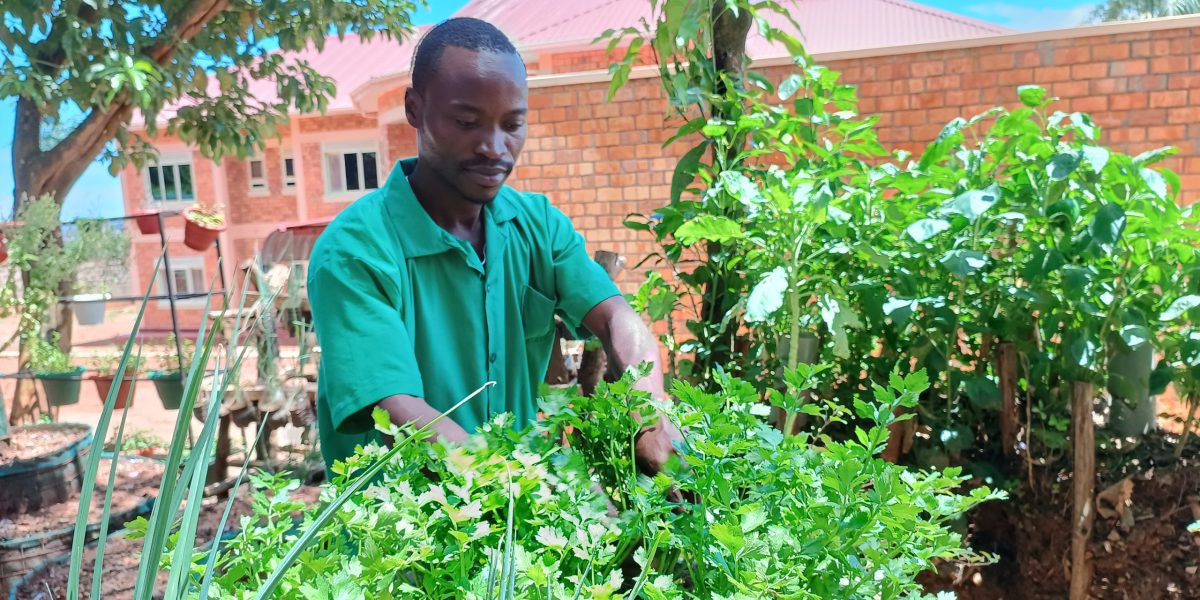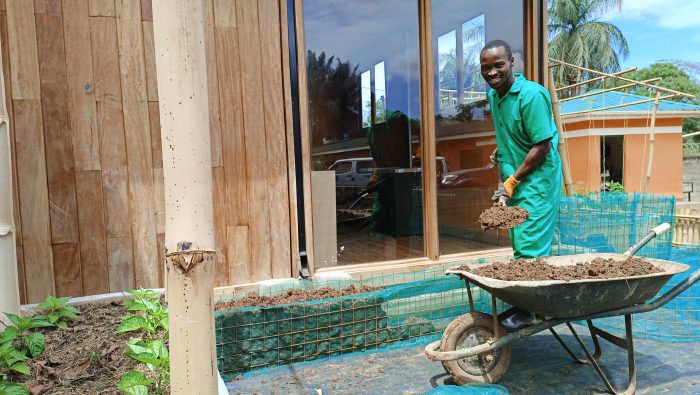JRS Uganda and State PRM: Livelihoods Program Plants Seeds of Hope
19 March 2024|Chloe Gunther

Every week, amidst the bustling activity in the JRS Kampala community center, David Munezero tends to the community garden. There, he, staff, students, and other community members can harvest an assortment of fruits, vegetables, herbs, and spices. This garden is one of the hundreds of positive outcomes from JRS Uganda’s livelihoods program which offers crucial support to refugees as they embark on journeys to continue their education, careers, and entrepreneurial pursuits.
Funded in part by the United States Bureau of Population, Refugees, and Migration, over 800 refugees have benefited from this comprehensive livelihoods program in Uganda. A thread that weaves through all JRS livelihoods programs is helping refugees rebuild their networks after leaving home. This livelihoods program includes different vocational skills training programs like fashion and design, catering, hairdressing, and computer literacy, as well as mechanics, electronic repair, and brick layering. JRS Uganda’s Business Development Services include programs such as internships, job placement, business grants, and entrepreneurship and business skills training.
David is one such person who participated and thrived in the JRS Kampala program. He fled Rwanda in 2019 due to conflict and violence and sought asylum in Kampala. In an interview with a Communications Officer at JRS Uganda, David shared his story and vision for the future.
In Rwanda, David was in dental school, preparing to become a doctor. After fleeing his home, he also lost access to this education. Yet, upon arriving in Kampala and connecting with the JRS team, he found a renewed sense of purpose and support. With assistance ranging from housing to essential provisions, JRS empowered David to chart a path toward self-sufficiency.
Before participating in JRS Kampala’s program, David had some prior knowledge of horticulture and beekeeping and harbored a vision of urban farming as a tool to alleviate poverty.
“I have a big dream to combine urban farming and beekeeping to fight poverty,” David said. This vision resonated deeply with JRS Uganda’s holistic approach to refugee support, which extends beyond immediate relief to encompass sustainable livelihood initiatives.
In alignment with JRS Uganda’s commitment to fostering self-reliance, David enrolled in the Business Skills and Training Course. These programs provide refugees with the necessary tools and knowledge to pursue various trades and entrepreneurial ventures.
 Furthermore, JRS Uganda’s livelihoods program integrates elements of community development, recognizing the interconnectedness of individual success and collective well-being. By fostering a supportive environment for entrepreneurship, refugees like David not only achieve self-reliance but also contribute to the broader community’s resilience and prosperity.
Furthermore, JRS Uganda’s livelihoods program integrates elements of community development, recognizing the interconnectedness of individual success and collective well-being. By fostering a supportive environment for entrepreneurship, refugees like David not only achieve self-reliance but also contribute to the broader community’s resilience and prosperity.
The fruition of David’s vision took shape behind the JRS Kampala office, where he, with a grant of $320.00, established a garden in July 2022. He soon began selling produce to the greater community.
Inspired by the impact of his garden, JRS Kampala advocated for the establishment of another garden in front of a new office, transitioning the landscape from decorative flowers to David’s design of practical food production.
Beyond his agricultural endeavors, David’s personal journey has seen profound transformations. Since his arrival, he has embraced new beginnings, gotten married and started a family. Since establishing the JRS gardens, David has also been contacted by an elementary school and four individuals to set up more urban farms.
“By promoting urban farms like these ones, I am offering solutions to global challenges like food insecurity, waste management, and poverty reduction,” he said.
David’s success is a testament to the value and impact of refugees in their host communities when they are provided with the opportunity to continue their careers and education. He plans to continue implementing these gardens around Kampala and educating the community about the power of urban farming.


